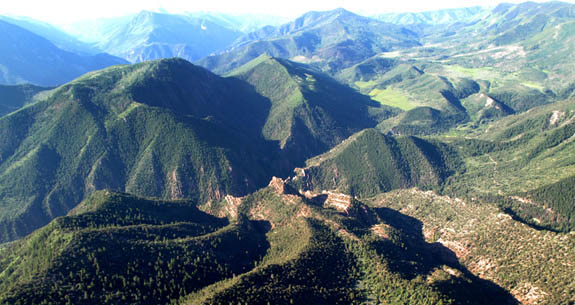Widgetized Section
Go to Admin » Appearance » Widgets » and move Gabfire Widget: Social into that MastheadOverlay zone
CORE Act not part of NDAA as Neguse pushes national biodiversity strategy

The Colorado Outdoor Recreation and Economy (CORE) Act, which would protect more than 70,000 acres of Colorado public lands as wilderness, failed to make the final cut in the National Defense Authorization Act.
The bill has been crafted over more than a decade of negotiations and passed twice in the U.S. House but has been stymied in the Senate. There was hope it would finally be passed as part of the NDAA.

It has been championed in the Senate by Colorado Democrat Michael Bennet.
“Michael is disappointed that the CORE Act wasn’t included in the final defense authorization bill, especially because it’s had a Senate hearing, passed the House, and has strong bipartisan support across Colorado. He’ll continue to pursue every opportunity to pass this critical bill for Colorado,” a Bennet spokesman told E&E (Energy & Environment) News.
In the House, the CORE Act was spearheaded first by Democrat Jared Polis and now Rep. Joe Neguse, whose district includes the eastern third of Eagle County.
Republicans representing the western two-thirds of Eagle County, Rep. Scott Tipton and now congresswoman-elect Lauren Boebert, have not supported the bill because of its prohibitions on natural-gas drilling in the Thompson Divide area near Carbondale. Boebert called it a “land grab” by the federal government.
The fate of the bill now may depend on whether Democrats regain control of the Senate in next month’s Georgia runoff elections.
In other environmental news, Neguse introduced a resolution calling for a national biodiversity strategy. Here’s that press release:
Washington D.C.—Today, Congressman Joe Neguse, Congressman Alan Lowenthal and Chair of the Natural Resources Subcommittee on Water, Oceans and Wildlife Jared Huffman, introduced a resolution in the U.S. House of Representatives calling for a national biodiversity strategy.
The U.S. and the globe currently face an unprecedented biodiversity crisis, driven largely by human activity. Recent scientific studies have confirmed human-driven activities are significantly damaging Earth’s ecosystems, altering marine environments, exploiting wildlife and plant species, accelerating climate change and polluting air, land and water. As well, the decline of biodiversity disproportionately impacts indigenous and other communities that rely on nature for essential services.
The resolution, introduced by Congressman Neguse, calls for a national commitment to addressing the biodiversity crisis by establishing a strategy that would ideally be developed through an interagency process announced by the president in an Executive Order. The Strategy process would encourage agencies to identify and pursue a full range of actions within existing laws and policies and encourage consideration of new ones. It would also promote accountability and progress in addressing the biodiversity crisis through a new quadrennial assessment.
“The decline of biodiversity presents a direct threat to the security, health and well-being of our communities and our planet. Human-caused activity has led to the damage of ecosystems, the exploitation of wildlife, increased pollution and the acceleration of climate change,” said Congressman Joe Neguse. “It is clear we need a coordinated whole-of-government approach to tackle these issues, and the United States should play a leadership role on the international stage in this regard. It’s time for the U.S. to take an ambitious global approach to address these issues and lead the world in conservation and climate action, that’s exactly what this resolution calls for.”
The resolution is supported by 60+ Colorado-based and national groups working on wildlife protection and conservation. Read the letter of support here. As well it is supported by leading scientists in the field. Read their support here.
“Given the current biodiversity crisis, it is more important than ever to assert U.S. leadership in the context of renewed global efforts to protect biodiversity and nature,” said Jamie Rappaport Clark, president and CEO of Defenders of Wildlife. “By establishing a National Biodiversity strategy, we can focus our commitment to addressing wildlife and habitat loss and tackling species extinction. Defenders of Wildlife thanks Rep. Neguse for his leadership on this issue and urges Congress to adopt this legislation.”
“We commend Rep. Neguse for taking on this crisis. A national biodiversity strategy must establish a bold, science-based, and inclusive vision that repairs and strengthens our existing backbone of environmental laws like the Endangered Species Act and also sets a new course for our country,” said Addie Haughey, Legislative Director at Earthjustice.“This isn’t just about the nearly one million animals and plants at risk of extinction. This is about people, communities, and rebuilding a more biodiverse and resilient future. We already know the damage we are causing, now let’s do something about it.”
The resolution lays out key areas that a national biodiversity strategy should include direction on, including:
- Setting a national goal of protecting at least 30% of United States lands and water to conserve biodiversity and address climate change by 2030;
- Affirming the need to protect threatened, endangered, and at-risk species from further extinction;
- Climate adaptation and mitigation strategies for biodiversity;
- Joining and leading international agreements to combat climate change, such as the Paris Agreement;
- Establishing climate corridors for conservation of species affected by climate change
- The rapid build-out of renewable energy;
- Reviewing existing, laws and programs that are relevant to addressing threats of biodiversity;
- Advancing conservation in coordination with State and Tribal governments;
- Incorporating indigenous knowledge;
- Means to ensure equitable access to nature; and
- Establishing regular monitoring, reporting, research and development and adequate funding for conservation efforts.
Background
In his first term, Congressman Neguse has been a leader on efforts to address climate change, conserve public lands, and tackle the biodiversity crisis. Congressman Joe Neguse joined a group of lawmakers to propose conservation of 30% of U.S. lands and waters by the year 2030. In August, he partnered with Senator Tom Udall to introduce landmark pesticide reform legislation to reduce levels of dangerous pesticides to protect farmers, children and consumers. In 2019, Congressman Neguse introduced legislation that was signed into law to protect and conserve wildlife in the Platte River Basin, and ensure compliance of water projects in Colorado, Wyoming and Nebraska with the Endangered Species Act.
His legislation, the Colorado Outdoor Recreation and Economy Act, or the CORE Act, which would preserve 400,000 acres of public land in Colorado has passed the U.S. House of Representatives twice. Through his role on the House Natural Resources and the Subcommittee on Waters, Oceans and Wildlife he’s advocated for endangered species protections and pushed back against the Administration’s efforts to strip protections for species at threat of extinction. He has also partnered with state and local efforts to protect wildlife in Colorado, such as efforts to re-introduce the gray wolf, and ensure humane treatment of wild horses and burros in the state. He hosted a congressional roundtable in Colorado in July to discuss Colorado’s success in ecotourism, wildlife protections and ensuring equitable access to the outdoors.


